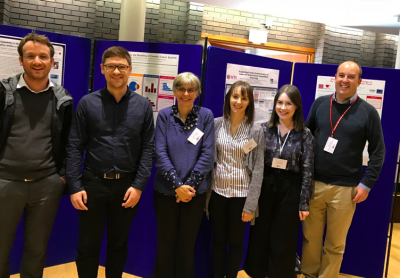Operational Research in Lancaster
Posted on 10 October 2018
Operational Research in Lancaster
 Image courtesy of Geraint Palmer
Image courtesy of Geraint PalmerBy Geraint Palmer, Cardiff University and Software Sustainability Institute fellow
The annual conference of the UK Operational Research Society is one of the primary ways that academics and practitioners in the field of operational research (OR) meet, collaborate, and discover each other's work and interests. Their 60th conference, OR60, was held at Lancaster University between the 11th and the 13th of September this year, and I was able to attend thanks to my Software Sustainability Institute fellowship.
Operational research is a branch of mathematics and computational sciences that employs cutting edge techniques to real world decision problems. These problems originate in diverse industries such as healthcare management, aviation, sport, transportation, and defence. As such, the conference attracts a diverse range of researchers from both academia and industry.
The @TheORSociety #OR60 conference is now underway @LancasterUni! Lots of great talks to look forward too! ? pic.twitter.com/KOSQR9eCmk
— OR60 (@LancasterOR60) September 11, 2018The conference began with a great keynote by Professor Anna Nagurney from the University of Massachusetts. She spoke about her long career in the discipline, and in particular her predictions for its future. She believes OR will be utilised to begin to revolutionise climate change, pollution and disasters, world hunger, and cybersecurity. One fascinating aspect of her talk was her recalling some of her earlier work on traffic management, and in particular the Braess paradox. This paradox states that there are some road systems that can become more congested by adding extra routes, or less congested by removing roads. This work in turn resulted in the mayor of New York pedestrianising parts of Broadway to improve traffic flow in the city.
The remainder of the conference was split into parallel streams according to either OR technique or application area. I focussed my attentions primarily on the computer simulation stream and the healthcare modelling stream.
Some particular talks I enjoyed include:
-
Anders N. Gullhav from the Norwegian University of Science and Technology spoke about using mathematical optimisation techniques to find the optimal placement of departments within a new build hospital.
-
Folarin Oyebolu from the Warwick University talked about using both simulation and heuristic algorithms to find the optimal scheduling policies for biological processes in the pharmaceutical industry.
-
Liam Hastie of SIMUL8 demonstrated how the software is used to optimise staffing and scheduling in a call centre.
-
Honora Smith from Southampton University gave two examples from her PhD students on how data mining techniques can be combined with simulation in a hospital setting. This included predicting the need for early cancer screening.
-
Andrew Dobson from Church of Uganda Bwindi Community Hospital spoke about a new OR course he has helped set up at his institution and its ambition to become a research university.
A semi-keynote of particular interest was given by Dr Christine Currie from Southampton University. She spoke of the problem of reproducibility of simulation studies in the domain of OR; presenting studies in which most models could not be reproduced at all due to the lack of available code and the ambiguity of simulation reporting. Some great work from many experiences simulation researcher give guidelines on reporting of simulation models in order to ensure trust and reproducibility of the work.
Really enjoyed talking to @GeraintPalmer today at his @LancasterOR60 poster! His new tool brings clarity and reproducibility to simulation and looks to be a great way to teach future simulation users! #orms #OR60 pic.twitter.com/Rr64QlNkZn
— Lucy Morgan (@storiLucy) September 12, 2018This leads nicely to my participation in the conference: I presented a poster on the recent paper "Ciw: An open-source discrete event simulation library”, which introduces a new discrete event simulation software in Python, whose aim is to facilitate open, readable, and reproducible simulation models. The presentation was a success with a number of young and experiences OR researchers taking an interest, and promising to have a play with the software. The presentation was part of a poster competition, where a colleague from Cardiff University, Emma Aspland, won with a fantastic poster entitled "Smart Simulation and Modelling of Complex Cancer Systems". She presented her current PhD work which aims to optimise cancer pathways in South Wales.
Delighted to win the poster prize at OR60 conference pic.twitter.com/szOvpcWDKa
— Emma Aspland (@EmmaAspland) September 15, 2018I enjoyed this conference and believe my participation was a success. I'd like to thank the Institute for the opportunity for attending this conference, and giving me the opportunity to speak about my research and software to academics and practitioners in the field. I learned a lot and met some great people.
